The BEST episodes of Wartime Farm
Every episode of Wartime Farm ever, ranked from best to worst by thousands of votes from fans of the show. The best episodes of Wartime Farm!
In a new eight-part series, historian Ruth Goodman and archaeologists Alex Langlands and Peter Ginn take on their biggest challenge yet - to turn back the clock and run Manor Farm exactly as it would have been during the Second World War. They will face one of the biggest challenges ever seen in the history of the British countryside - what Churchill called ‘the frontline of freedom’.
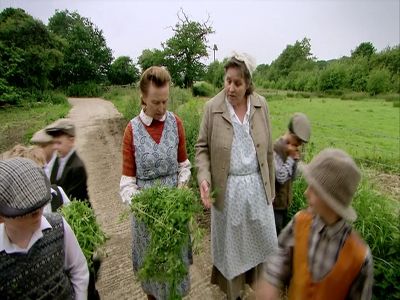
#1 - Episode 6
Season 1 - Episode 6 - Aired 10/11/2012
The Wartime Farm team tackle the conditions faced by British farmers in 1943, when food imports slumped to their lowest level during the war. The government feared a crisis and after four long years at war, Britain's farmers were challenged with somehow increasing food production yet again. There were renewed shortages of animal feed so Alex and Peter resort to producing a hay crop from grass in the church yard and use some clever 1940s technology to get the job done. With tasks mounting up on the farm, the team turn to a popular source of additional wartime labour - children. Children's harvest camps were set up by the Ministry of Agriculture to release kids from school during periods of urgent need on farms, and over 70,000 pupils took part, paid six pence an hour to avoid accusations of exploitation. Ruth enlists eager child labour to collect herbs that were desperately needed by the pharmaceutical industry to make medicines during the war. But once the job's done, she has to feed them. A rat catcher helps Alex deal with the farm's rodent problem, a job which usually fell to Land Girls. It is estimated that rats destroyed two million tons of crops during the war, costing the country £60 million a year. Alex also tries his hand at making a much needed sugar substitute - honey. Ruth discovers the methods women used to look good despite the restrictions of rationing. After making a new dress from old flour sacks, she gets a makeover from a pair of wartime hair and beauty experts. While Peter is getting to grips with a vintage hay baling machine, Ruth and Alex attend a party at the village hall, where they experience a new dance phenomenon brought to Britain by African-American GIs, the jive.
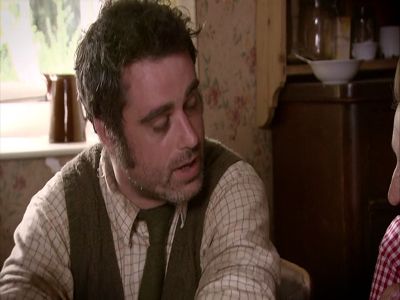
#2 - Episode 8
Season 1 - Episode 8 - Aired 10/25/2012
The team face the conditions of 1945 and prepare to harvest the wheat crop following one of the wettest summers in memory. Even as the conflict drew to a close, the need for home-grown food became greater than ever. With Britain sharing the responsibility for feeding populations across war-torn Europe while struggling to afford imports, and American aid no longer available, rationing lasted well into the 1950s. As a fitting send off, the team celebrate the harvest with a 'Holiday at Home' - inspired by a government scheme to encourage exhausted workers to make the most of time off without travelling anywhere. Alex has a surprise up his sleeve to make the party go with a bang.
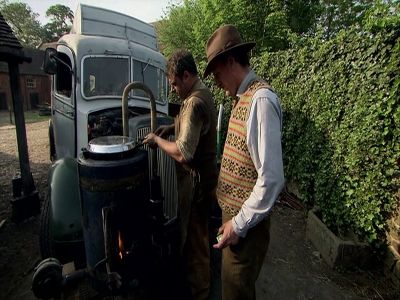
#3 - Episode 5
Season 1 - Episode 5 - Aired 10/4/2012
The Wartime Farm team tackles the conditions faced by British farmers in 1942, when Hitler's U-boats continued to attack British ships, slashing imports and inflicting massive shortages on the country. Ruth finds out how Britain coped with shortages of the wood vital for the war effort in the building of aircraft, ships and rifles, as well as pit props for crucial coal mining. With her daughter Eve, she travels to the New Forest and discovers how women known as 'Lumber Jills' were drafted in to fell trees in the Women's Timber Corps. Meanwhile, Peter and Alex face up to the wartime petrol crisis. Peter embarks on an ambitious plan to convert a 1930s ambulance to run on coal gas. Alex experiences the conditions faced by the Bevin Boys - conscripts who were sent to coal mines instead of the armed forces because the need for coal was so great. Having converted the ambulance and collected the coal to run it, Peter faces the question: will it work? Also in this episode, the boys revert to a Victorian solution to the shortage of animal feed - using traditional horsepower to operate a root slicer - whilst Ruth sets up an Emergency Feeding Centre. Subsidized by the government to provide cheap food off ration for air raid victims, these 'British Restaurants', as Churchill dubbed them, quickly caught on. Eating out had traditionally been the preserve of the upper class and most ordinary people had never eaten in public before - many even felt embarrassed at the prospect. The 'British Restaurants', envisaged as a short-term response to food shortages, made a lasting change to the nation - introducing the concept of high street dining for the masses.
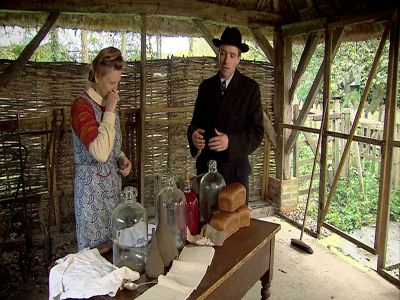
#4 - Episode 2
Season 1 - Episode 2 - Aired 9/13/2012
The team tackle the conditions faced by British farmers in 1940, when the full impact of rationing took hold and which also saw Britain face the onslaught of Nazi bombing in the Blitz. Ruth finds out how about the impact rationing had in the kitchen as food became strictly limited - and also explores the temptations of the black market. Alex and Peter are confronted with vastly reduced supplies of feed for the animals, so attempt a method encouraged by the government: making "silage". This involves not only finding alternatives sources of feed to store for winter, but also creating a container to store them in. And for this they find out how the Women's Land Army could be of help. Along they way, they also discover how racial prejudice reared its ugly head during Land Girl recruitment - only to be overcome by the actions of a local farmer. Ruth goes on a canning drive - gathering fruit to preserve and donate to the war effort - with the local Women's Institute.
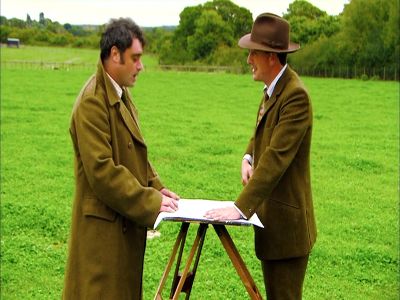
#5 - Episode 1
Season 1 - Episode 1 - Aired 9/6/2012
The first episode finds the farmers in a new location, a new time period and with a new team member. There is a farmhouse to modernise, strict new rules to abide by and air raid precautions to contend with. The team begin by reclaiming badlands to grow new crops. Peter works with a blacksmith to design a special 'mole plough' to help drain the waterlogged clay fields. Ruth and Alex get to grips with a troublesome wartime tractor - and must plough through the night to get the wheat crop sown in time. On top of farmers' herculean efforts to double food production, their detailed knowledge of the landscape also made them ideal recruits for one of the war's most secret organisations - the 'Auxiliary Units', a British resistance force trained to use guerrilla tactics against German invasion.
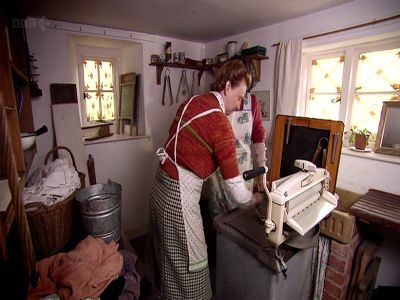
#6 - Episode 4
Season 1 - Episode 4 - Aired 9/27/2012
The team discovers that Wartime Farmers could lose everything - their home and their land - if the government did not think they were productive enough. Over 2,000 farmers deemed 'not good enough' were thrown off their farms during the war. Ruth, Peter and Alex face a World War Two-style government inspection, meeting an expert who tells them to grow and to get their milking operation up and running. In the process they confront the wave of mechanisation that government regulation brought to wartime farming, grappling with a new tractor and getting to grips with a milking machine. Yet they are dealt a bitter blow with the loss of a prime dairy cow. Peter also launches a rabbit-breeding concern and they take in the latest release from the Ministry of Information, who made films urging farmers to use the very latest techniques in the fields. The team also discovers the chilling story of a local farmer who lost his life in a dramatic shoot-out with the police after the authorities tried to remove him from his farm for failing to meet his required targets. With their hard work completed the inspector returns to judge the state of the farm and award them their all-important official 'grade' - determining whether their efforts have been a success or a failure.
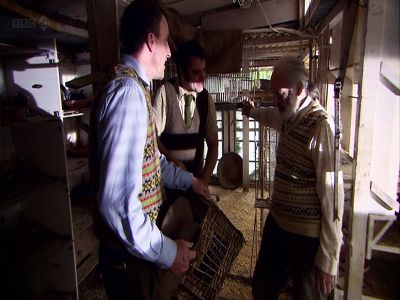
#7 - Episode 7
Season 1 - Episode 7 - Aired 10/18/2012
The team face the farming conditions of 1944 when Britain had been at war for five years and millions of troops packed into the fields of southern England as the Allies prepared for the D-Day landings. Farmers did their bit by growing vast amounts of flax but the wettest summer for a century has devastated the crop at the farm, and Alex and Peter must take drastic action to save it. Ruth revives the traditional craft of basket making to create a pigeon transporter while Alex and Peter head out into the English Channel to find out how racing pigeons were trained to carry intelligence to and from occupied France. As D-Day drew closer, foreign troops formed close bonds with the locals, drinking together and playing games, such as the baseball game Americans played at the farm in 1944, which the team recreates.
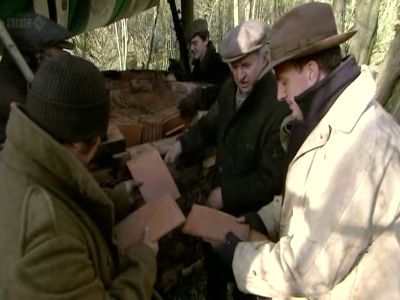
#8 - Episode 3
Season 1 - Episode 3 - Aired 9/20/2012
The team attempt to tackle the conditions faced by British farmers in late 1940, as the heavy bombing of the Blitz destroyed Britain's cities and drove millions to seek refuge in the countryside. Alex and Peter have to work in the freezing cold to turn inhabitable outbuildings into refugee shelters. They also are taught how to set up 'decoy fires' to distract German bombers. Ruth becomes involved with the Royal Observer Corps.